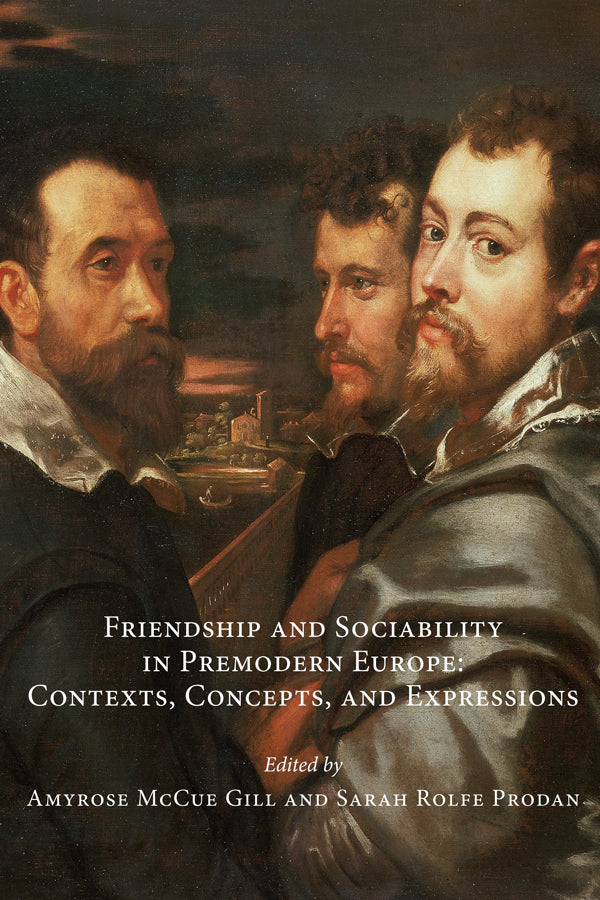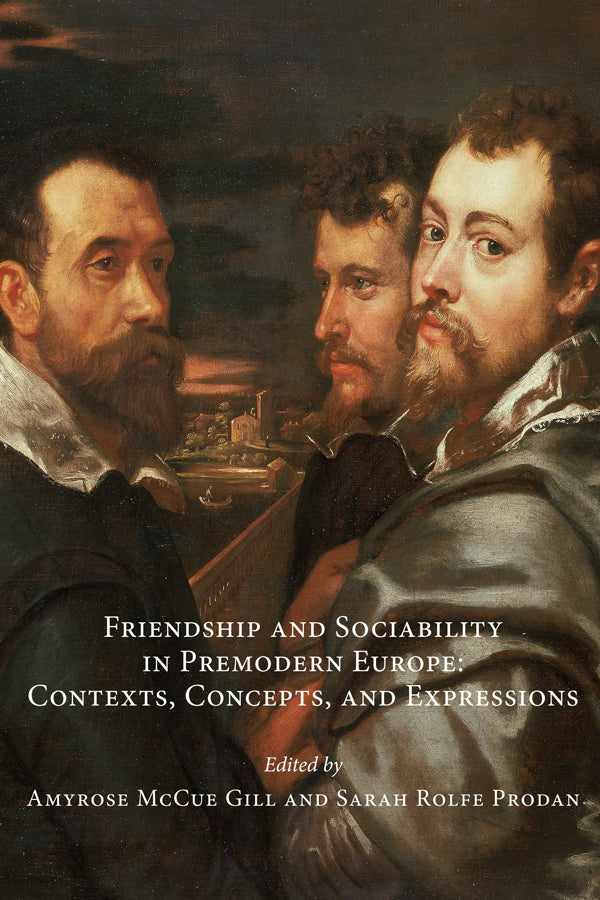Friendship and Sociability in Premodern Europe: Contexts, Concepts, and Expressions
Edited by Amyrose McCue Gill and Sarah Rolfe Prodan - ES33
Overview
Friendship and Sociability in Premodern Europe explores ideas and instances of friendship in premodern Europe through a series of investigations into amity in discrete social and cultural contexts related to some of the most salient moments and expressions of European history and civilization: the courtly love tradition, Renaissance humanism; the spread of syphilis; the Reformation, the Counter-Reformation (and the attendant confessionalization and wars of religion); Jesuit missions; the colonization of America; and, lastly, expanding trade patterns in the Age of Discovery. The essays progress thematically as well as logically with the goal of providing a panoramic view of friendship and sociability in premodern Europe rather than a comprehensive history or unified theory of premodern friendship. Each paper presents an element of novelty – a revised or adapted concept, tradition, or strategy of social and interpersonal relating in the premodern world.
Amyrose McCue Gill (Santa Clara University) has published on the topic of conjugal friendship in the works of Leon Battista Alberti and Laura Cereta. She is currently engaged in a translation project on Frate Cherubino’s spousal and spiritual treatises, an edited project on sex acts in early modern Europe, and a book project on friendship between husband and wife in Quattrocento Italy.
Sarah Rolfe Prodan (Centre for Reformation and Renaissance Studies, Toronto) is the author of Michelangelo’s Christian Mysticism: Spirituality, Poetry and Art in Sixteenth-Century Italy (Cambridge University Press, 2014) which examines, in part, the spiritual friendships of reform-minded Catholic intellectuals known to Michelangelo in sixteenth-century Italy.
318 pp.
ISBN: 978-0-7727-2170-9 softcover
Published: 2014
Contents
Introduction, Sarah Rolfe Prodan
I. Individual Friendships
1. “‘No Greater Pleasure in this Life’: The Friendship of John Locke and Edward Clarke,” Adriana Benzaquén
2. “The Theatre of Friendship in Early Modern French Memoirs: The Case of Pontis,” Malina Stefanovska
3. “Dante’s Rhetoric of Friendship from the Convivio to the Commedia,” Francesco Ciabattoni
II. Networks of Friends
4. “Ad comunis epystole lectionem: Pan-Italian Familiaritas and Petrarch’s Community of Friends,” Steven Baker
5. “Syphilis, Suffering, and Sodality: Friendship and Contagion in Renaissance Mantua,” Sally Hickson
6. “‘Accompanied by a Great Number of Their Friends’: Warrior Nobles and Amitié during the French Wars of Religion,” Brian Sandberg
7. “Pierre Bayle’s Quest for Pacified Relationships,” Jean Bernier
III. Friendship in Political and International Relations
8. “Peace and Friendship in Early Modern Catholic Europe: Towards a Political History of Human Relations in Counter-Reformation Culture, 1580-1650,” Paolo Broggio
9. “Matteo Ricci and his Confucian Friends: Interfaith Friendship in the Clash of Asian and European Humanisms,” Hyun-Ah Kim
10. “‘To Heal the World’: Commercial Exchange as a Form of Friendship in Renaissance Thought,” David Harris Sacks
Praise
“There is much to recommend this volume. It offers a wide range of specific, intriguing examples of friendship as, in the editors’ words, a “guiding ideal, metaphor, or prescriptive force.” Taken together, the articles vividly demonstrate that friendship is in fact both complex and historically significant.” — Constance Furey, University of Indiana
Reviews
Archive for Reformation History/Archiv für Reformationgeschichte, 44 (2015), pp. 12.
Comptes Rendus, 63:3 (2016), pp. 189-190. Reviewed by Christian Kühner.
La Bibliothèque d’Humanisme et Renaissance, 77:2 (Summer 2015). pp. 470-471. Reviewed by Ullrich Langer.
Parergon – Journal of the Australian and New Zealand Association for Medieval and Early Modern Studies, 32.2 (2015). pp, 297-298. Reviewed by Deborah Seiler.
Renaissance and Reformation/Renaissance et Réforme, 39.2 (Summer 2016), pp. 193-195. Reviewed by Emily O’Brien.
Renaissance Quarterly, 69:2, pp. 744-746. Reviewed by Martiere Lopez.
Couldn't load pickup availability


